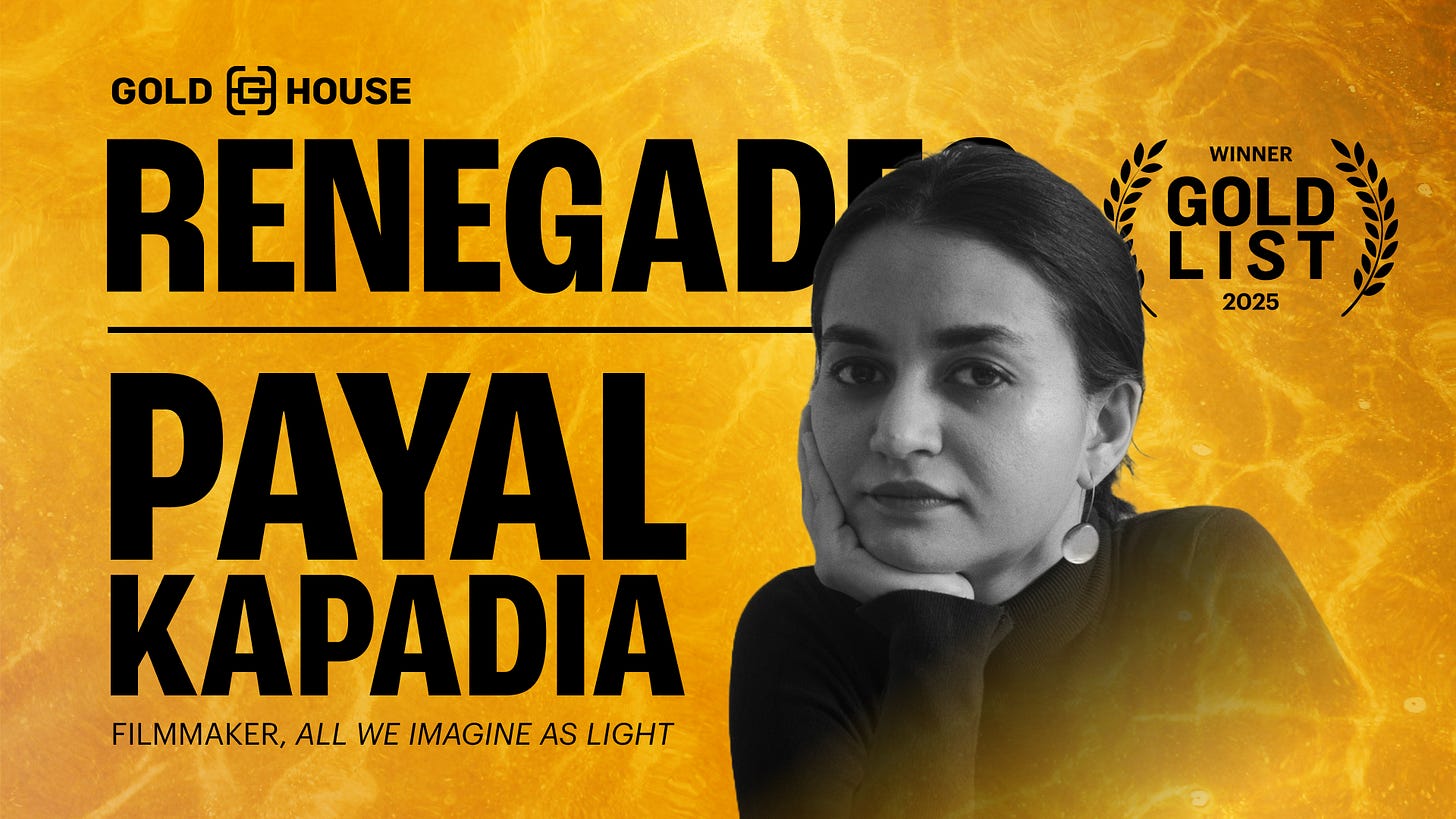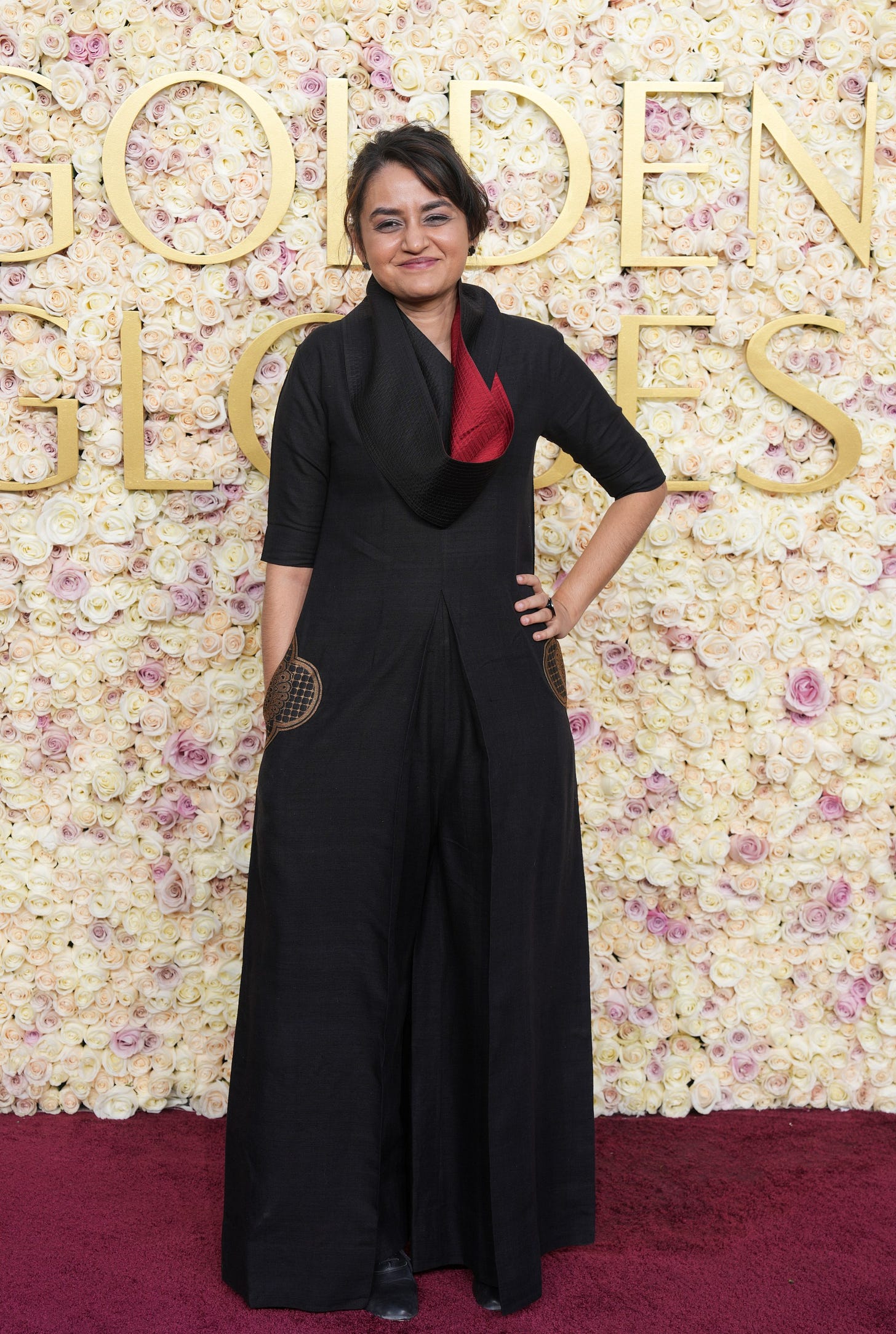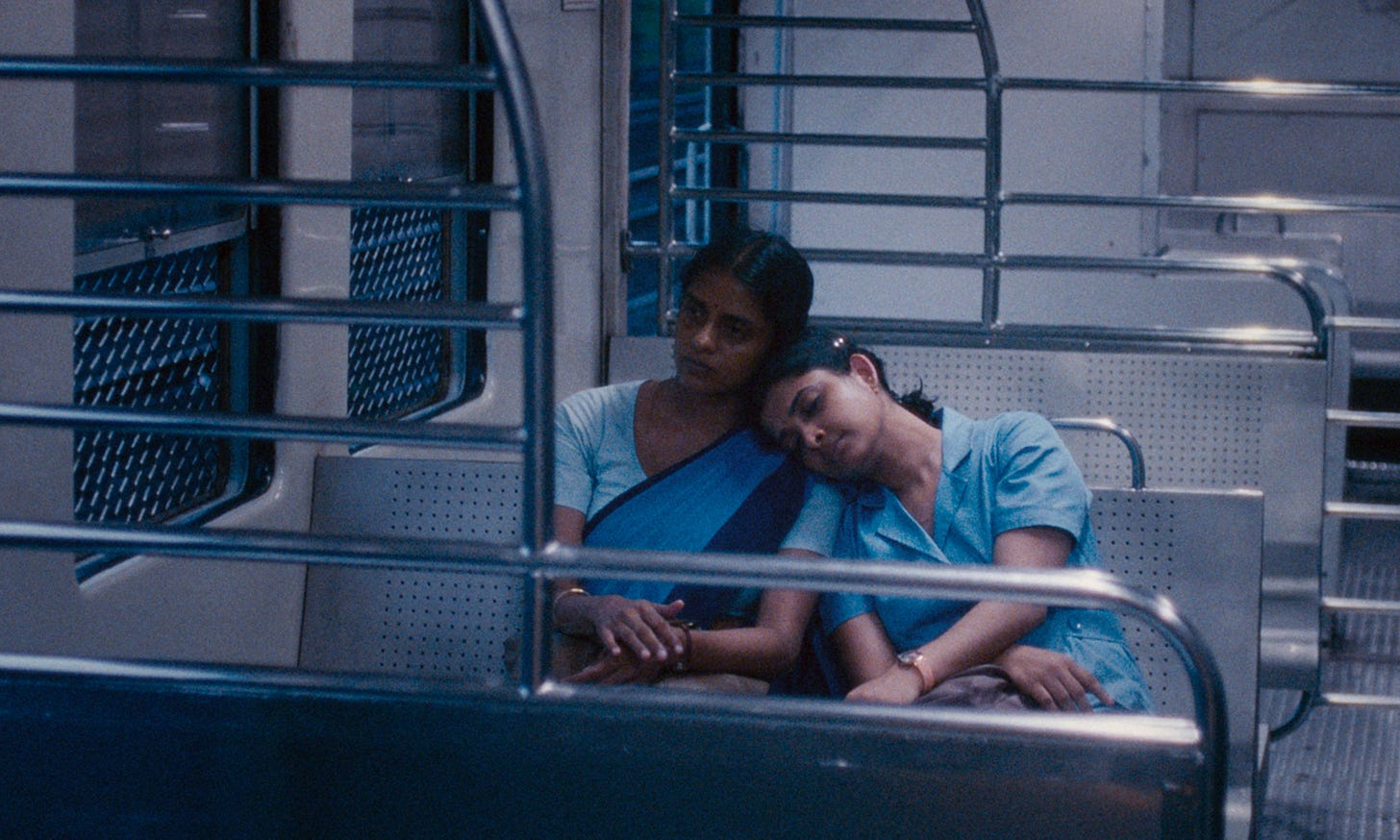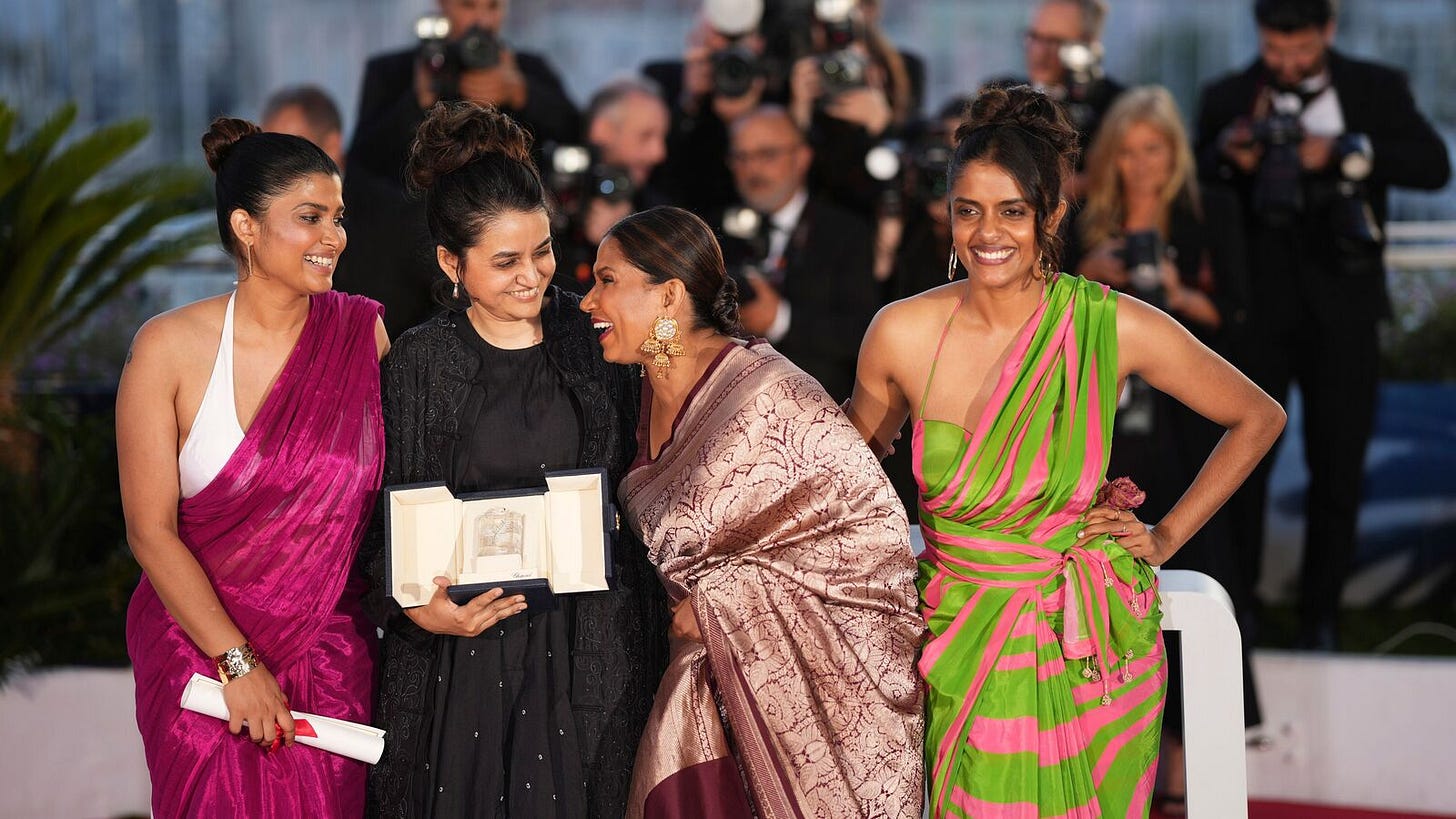Renegades | Payal Kapadia on Building Imaginary Worlds through Cinema
Best Picture & Best Original Screenplay Gold List Winner Payal Kapadia’s “All We Imagine as Light” Continues to Wow Audiences around the World

Welcome to Renegades, Gold House’s editorial series spotlighting Asian Pacific leaders and creatives who are carving their own paths and defying stereotypes along the way.
This week features Payal Kapadia, writer and director of the internationally acclaimed film All We Imagine As Light, an ambient tale of love, longing, and sisterhood set against the frenetic poeticism of Mumbai, India. Kapadia first wowed audiences at Cannes Film Festival, where the film premiered and won the coveted Grand Prix prize—a first for a film submitted from India, and a first especially for an Indian, female director. And now, Kapadia’s award-winning film has been recognized by Gold House’s annual Gold List, celebrating the past year’s best in Asian Pacific cinema.
She talks to us about the journey from short films to full-length narrative features; meeting lifelong collaborators through the global, film festival circuit; and her belief that young, Indian audiences crave an array of different types of cinema. See All We Imagine as Light in theaters now! And read the full Gold List now!
What did you want to be when you grew up and how does that compare to where you are now?
When I was a child, I decided that I wanted to be an architect. At the time, one of my biggest preoccupations was making homes out of cards and constructing whole cities around it, with mismatched and found objects. I would preoccupy myself alone for hours, making weird buildings out of cards. I think filmmaking is connected in some way to imaginary worlds: just that one builds those out of questions one has of the reality around oneself. Reality is also as fragile as a house of cards, but thankfully, film lasts much longer.

You began your filmmaking journey with short films and later gained recognition for your documentary, A Night of Knowing Nothing. How did these early experiences shape your creative approach and filmmaking style today?
Short films are a whole other medium, and they help you think in a way that is less complete and more open-ended. They can be closer to poetry than to prose. For me, making non-fiction films taught me to work with limitations and find solutions within those. With the fiction film, we made some drastic choices with shooting in a non-fiction style because it gave us more flexibility in capturing the essence of the city rather than reconstructing it. That too came from the limitation of the budget, but finally became the style of the film.
All We Imagine as Light marks a significant milestone as the first Indian feature in competition at Cannes in 30 years. What does this recognition mean to you, especially as the film is your feature debut?
It means a lot! Most importantly, it means that our film gets distributed in over fifty countries and several cinemas in India, which would not have happened otherwise. Every recognition helps with taking our film out to the public, and that is the most important thing for any filmmaker.
The film’s quiet and delicate tone is brought to life through powerful performances by Kani Kusruti, Divya Prabha, and Chhaya Kadam. What drew you to these actresses and what gave you confidence in their ability to bring the story from script to screen?
They are remarkable artists and incredible collaborators. I was always in awe of Chhaya Kadam’s work through her previous films, especially her role in the iconic Indian film, Fandry. She is a veteran actress and I approached her with some trepidation. When she found out that the character of “Parvati” is from Ratnagiri, she was interested in the role as she too is from the same region. That really helped in shaping the character. Kani Kusruti is well known in art house cinema. I have been wanting to work with her for a few years. She comes from a background in physical theatre and uses her body, gestures and fierce expressions to emote more than words. As the character she plays does not use too many dialogues, I think that Kusruti’s theatre background really brought to the forefront her inner turmoil. Lastly, Divya Prabha is a very versatile actress, and she works very hard to understand and internalize the character. Although the character she plays, “Anu”, is far younger than her, she managed to work on the lightness of her being and bring an incredible spark to the screen.

You’ve been actively engaging with your India-based audiences through social media, helping meet the demand to see your film in cinemas across the country. Has the outpour of affection in response to your work, particularly in a country dominated by Bollywood, surprised you or did you sense a growing appetite for homegrown, independent films?
I am genuinely grateful to the audiences in India. I always knew that there are people who have an appetite for various different kinds of cinema, especially the young generation who are always questioning things and looking out for diverse cinema. It has reaffirmed my belief that we in India are open to an array of cinema, and there is not just one kind of cinema that people seek.
What advice would you give to aspiring filmmakers who are just beginning their careers, especially those trying to navigate independent cinema?
It is not going to be an easy journey. But it gets better, especially when you find the right collaborators. I have a team of people I work with—both technicians as well as producers—who have been extremely instrumental in the making of this film. It is important to find these collaborators with whom you can grow together.
As you celebrate the successful reception of All We Imagine as Light, what are you most excited about next? Is there a person you have met through this awards and film festival journey that you’d like to collaborate with in the future?
I am so excited to start my next project! Making my first fiction film taught me so much, and I am really keen to put that learning into the next film. I also collected a lot of material for this project during the making of AWIAL, so putting it down on paper is what is keeping me up at night. Going to film festivals and meeting new people always leads to some good collaboration. In fact, I met my French producers, as well as my editor, at a film festival! We formed a close bond and work together now, across continents. You never know what the future holds and which random coffee can turn into a lifelong friendship and collaboration.

Lightning Round
Favorite Book: “Our Faces My Heart, As Brief as Photos” by John Berger
Last Film You Watched: Kaala by Pa Ranjith
Go-To Theater Snack: I try not to eat in the cinema, as I get so engrossed in the film.
Dream Vacation Destination: The Czech Republic. I have been obsessed with Czech new wave films since I was a student and I would love to visit Prague and see what those places are like now.
Most Memorable On-Set Experience: Memorable, but not in a good way! We had a terrible experience on the set of AWIAL when we were shooting in a village close to a forest. We were visited by a cobra snake! Fortunately, no one got hurt and the snake was rescued by a professional who set it free in the forest. But it was terrifying, and we were all scared of coming back to the set.
Thank you for reading Renegades!